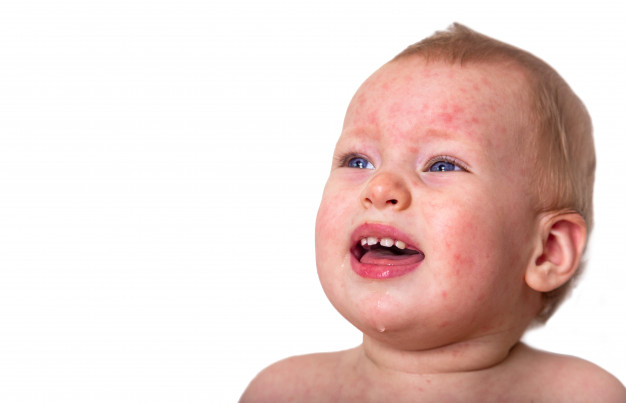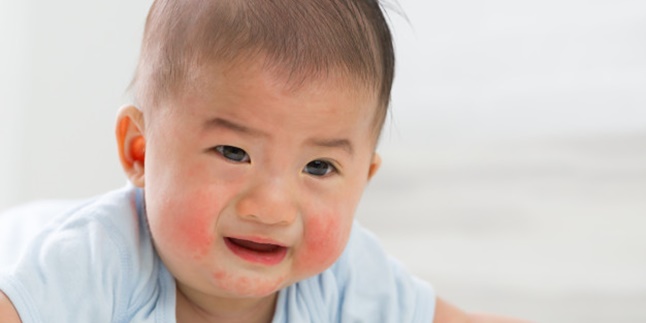Kapanlagi.com - Milk is one of the recommended nutritious drinks to consume. Milk contains many nutrients needed to support children's growth. However, unfortunately, there are some cases where children experience cow's milk allergy. Similar to other types of allergies, cow's milk allergy can trigger various problems. Therefore, it is important to know the symptoms of cow's milk allergy as early as possible.
In the medical world, cow's milk allergy is often referred to as lactose intolerance. As reported from healthline.com, lactose intolerance is caused by the inability of the lactase enzyme to break down lactose in digestion. This can happen to some children. The reason is, at a certain age, the production of the lactase enzyme can decrease. So, what are the symptoms of lactose intolerance?
Summarized from various sources, here are some symptoms of milk allergy.
1. Bloating

(credit: freepik)
Bloating is one of the digestive problems that many people often experience. Bloating can also be one of the symptoms of milk allergy in children and adults. This is because lactose that cannot be fully processed will reach the large intestine. The lactose will then be absorbed by the cells in the large intestine.
After being absorbed by the cells in the large intestine, lactose will be fermented, resulting in the release of fatty acids and gas. The increase in fatty acids and gas is what causes bloating and even cramps. Milk allergy in children can also cause other symptoms, such as nausea or even vomiting.
2. Diarrhea
As previously explained, lactose intolerance in milk can cause digestive problems, including diarrhea. According to healthline.com, lactose intolerance can increase the volume of fluid in the large intestine. As a result, the fluid content in the stool also increases, leading to diarrhea. Diarrhea is one of the most common symptoms of milk allergy in children.
3. Constipation
In addition to diarrhea, milk allergy in children can also be marked by constipation. In contrast to diarrhea, constipation is a condition of difficulty in defecation. Constipation is also a common digestive problem. Therefore, not many people realize it as a symptom of allergy. However, constipation as a symptom of milk allergy does indeed occur rarely, and not as frequent as diarrhea.
Constipation due to milk allergy occurs because, when lactose intolerance occurs, bacteria in the large intestine undergo fermentation process of lactose, resulting in methane gas. It is believed that this methane gas content will then slow down the movement of food in the intestine, causing constipation.
4. Shortness of Breath
Not only digestive problems, milk allergy can also trigger other health problems. In infants or children, symptoms of milk allergy can be marked by respiratory disturbances. One sign is the frequent sound of breath. This can happen because the respiratory tract is obstructed. It can be caused by mucus production due to lactose intolerance reaction.
5. Red Spots Appear

(credit: freepik)
Allergic reactions in each person are indeed varied. One of the most common is the appearance of red spots on the surface of the skin. The same thing happens when experiencing milk allergy. Some children who have lactose intolerance may react with the appearance of red spots on the skin. Moreover, babies' skin is still considered sensitive. Therefore, in addition to red spots, in babies, these allergy symptoms are often accompanied by rashes and itching.
6. Coughing or Choking

(credit: freepik)
Another symptom of milk allergy in children is coughing or choking when drinking milk. Although it may sound trivial, this should be taken seriously. Because coughing and choking while drinking is often considered a common occurrence.
When a baby coughs or chokes while drinking milk, you should be suspicious. This could be a reaction from the baby's body rejecting substances that it cannot tolerate. Unlike normal coughing or choking, when experiencing this, babies tend to feel pain. Therefore, this symptom is often accompanied by crying or a suddenly fussy baby.
Those are some of the symptoms of milk allergy in children. Parents should be aware of the above, in order to take preventive measures. If experiencing the above symptoms, it is advisable to consult with your child's doctor immediately. Hope this is helpful!
(kpl/psp)
Disclaimer: This translation from Bahasa Indonesia to English has been generated by Artificial Intelligence.















